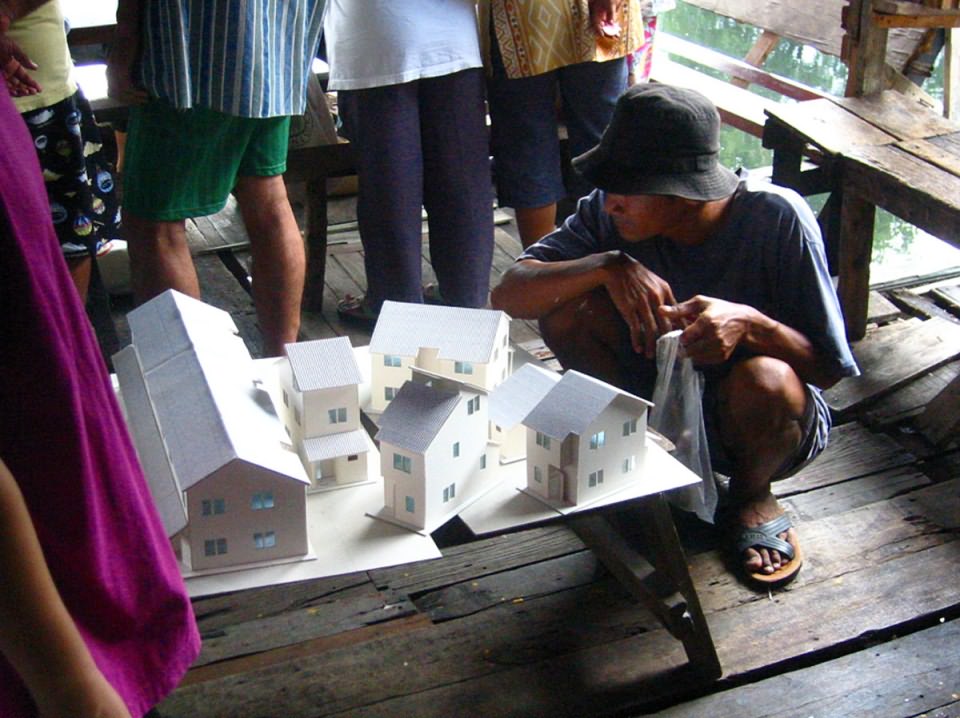Could local decision making and local finance management solve housing shortages – Lessons from Thailand
by Canem Ozyildirim, Associate at Locality Matters
The number of people who live in slums in urban Thailand is disputed widely, but stands roughly between two and five million people [1]. Most of these people live in sub-standard housing with little to no security of tenure and suffer from poor living environments. With almost half the world population living in urban areas, housing for the poor is a growing problem for many countries and a lot can be learnt from the way Thailand is addressing the issue.
In 2003, the Thai Housing Ministry set up the Baan Mankong programme to provide urban communities with long term, low-interest loans to upgrade their homes. Instead of destroying slum areas, the Thai Government is empowering poor urban communities by letting them be in charge of transforming their communities into more attractive and better quality settlements.
[testimonial author=”Resident of Kao Seng”] It [community] used to be slum, but now it is a house. In the past when we went back home, we were afraid to say we live in Kao seng. People might look down [or] have antipathy. However, recently we speak proudly that we live in Kao seng. We speak louder than ever before. [2][/testimonial]
Providing the poor with flexible financing options is one of the key components of the programme. This works hand in hand with the requirement that each settlement forms a savings group and manages their finances collectively. The savings group becomes the core of the community, managing all activities associated with the upgrading operation, from searching for a new piece of land to learning how to plan projects. All around Thailand, they collaborate with local government, volunteer architects, designers and university students to survey all available land, and develop a plan of action to upgrade their settlements within three to four years. The appropriate government bodies then review these plans and channel infrastructure subsidies and housing loans directly to the communities.
Savings groups provide communities with the necessary structure to manage a complex upgrading process collectively and reach out to other communities to share their knowledge and experiences. They also serve a very important social function: Through these groups, everyone in the community, even the poorest individuals, is included in the decision-making processes. In this way, savings groups strengthen the bonds within a community and ensure that each individual’s needs are addressed in the design and production of new settlements. As such, the Baan Mankong program accomplishes two important tasks with a single effort, empowering marginalized individuals while providing them with security of tenure.
For example, in the community of Bonkai, a long-established informal settlement in central Bangkok, 566 households formed a cooperative and negotiated with Crown Property Bureau to rebuild 200 houses that were damaged in a recent fire. Bonkai community was the first to be issued a ‘community lease contract’ in Thailand. The community decided to manage the reconstruction effort in three phases, so that all dwellers could remain on site. In order to fit every impacted household, they decided to build 72 three-storied units. Each unit was built on twenty-four square meter plots, for an average cost of US$4901. [3]
As a precaution against land speculation and gentrification, the program requires communities to make decisions collectively about selling individual properties or making any other changes to the settlement. One of the most common types of tenure in the program is cooperative ownership (other types of tenure include long-term and short-term leases, in which case the community still makes decisions together about selling or building in the settlement), which ensures that the future of the settlement is decided together. There are over 1,010 Baan Mankong projects under way, in 226 towns and cities, involving 54,000 households. [4]
This is not to say that Baan Mankong does not have its problems. The level of debt might be disconcerting and cause long-term stress for many slum dwellers. The project might also disservice those who are renting their dwellings. Strategies that prioritize helping original settlers and reducing participants’ debt should certainly be considered. Yet, the bottom-up, community-led style in which Thailand addresses the issue of informal settlements is exemplary. It not only presents a sustainable method to conquer a monumental problem, but also serves to show how communities can overcome complex urban issues on their own and function as local democracies.
[testimonial author=”Onn (36 years old), Bangramard resident”]Many friends asked me, do I regret destroying this home? I simply say yes, I really do. But it is worth it. If it can be used in exchange for thirty years of permanent tenure, I accept that. My daughter is just eight years old. If we did not attend the project [Baan Mankong] and the [landlord] suddenly need the land back, I have no idea where we would go. [5] [/testimonial]
The Thai approach may not be directly applicable in the UK, and Thailand might be an unusual place to look for inspiration with regards to this issue. However, Baan Mankong not only presents a potentially sustainable method to conquer a global social problem, it also serves to show that communities can be efficient and reliable local decision-making bodies. Key approaches of the programme, namely, the policies that allow for much more localized cooperative ownership, community management of financial resources and local decision-making could be relevant for the UK. Incorporating these measures into local government could help problem-solve and plan more efficiently at a community scale. It might also just create less isolated and more independent communities.
REFERENCES
[1] UN HABITAT, 2008:248; CODI, 2004
[2] Rhabibadana, 2007: 3
[3] CODI, 2006
[4] CODI Website, http://www.codi.or.th/housing/aboutBaanmankong.html
[5] Chutapruttikorn, 2009: 17 [/box]






Leave a Reply
Want to join the discussion?Feel free to contribute!